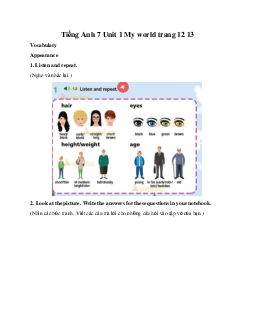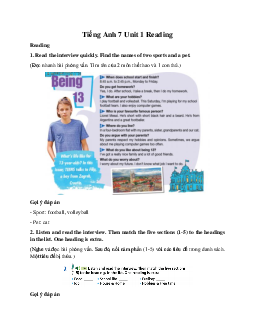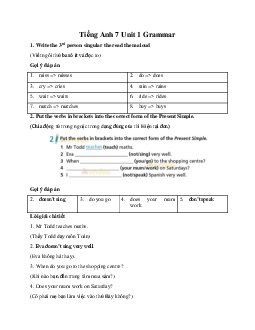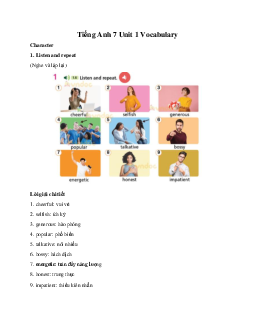




Preview text:
Tiếng Anh 7 Unit 1 Skills 1f Reading
1. Look at the pictures. What do these gestures mean to you? What do you think the
blog post is about? Listen and read to find
(Hãy nhìn vào bức tranh. Những cử chỉ này nghĩa là gì? Bạn nghĩ bài đăng trên blog là về
cái gì? Nghe và đọc để tìm)
2. Read the blog again. Decide if the statements are R (Right), W (Wrong) or DS (doesn’t say)
(Đọc lại blog. Quyết định nếu các câu sau là Đúng (R), Sai (W), hoặc Không nói đến (DS) Gợi ý đáp án 1. R 2. W 3. DS 4. W 5. W
3. Replace the words in red below with the words/ phrases from the blog.
(Thay thế các từ được in đỏ dưới đây bằng các từ/ cụm từ trong blog) Gợi ý đáp án 1. this = very friendly 2. this = everything is OK 3. He = Andy 4. this = the local language
4. Think. What do the gestures in the text mean in your country?
(Suy nghĩ. Những cử chỉ trong đoạn văn có ý nghĩa gì ở đất nước bạn?) Gợi ý đáp án
In our country, we only hug our family and close friends. The thumbs up means
everything is OK. We nod our heads to say “yes” and shake them to say “no” Vocabulary
Cultural etiquette in the UK
5. a. Listen and repeat (Nghe và lặp lại)
b. What do these gestures mean in the UK? Make sentenes Gợi ý đáp án
Picture 2: In the UK, people curl their index fingers to ask somebody to come to them.
Picture 3: In the UK, they point to show something or somebody.
Picture 4: In the UK, they cross their fingers to wish for luck.
Picture 5: In the UK, they give a thumbs up to show that everything is good.
Picture 6: In the UK, they tap their noses to tell somebody to keep something secret. Speaking
6. Think. Which of the gestures in Exercie 5a mean the same in your country?
(Suy nghĩ. Những cử chỉ nào trong Bài 5a có nghĩa tương tự ở đất nước bạn?) Gợi ý đáp án
In Vietnam, we rarely tap our nose. We never curl the index finger or cross our fingers;
both gestures are very rude. We also shake hands to greet people. If you want to point at
something, you should use your open hand. We usually use thumbs up to show everything is OK. Listening
7. Listen to Sam and Jessica talking about Jessica’s holiday to Germany. Decide if
the statements are R (Right) or W (Wrong)
(Nghe Sam và Jessica nói về kì nghỉ của Jessica tới Đức. Quyết định nếu câu Đúng (R) hoặc Sai (W)) Gợi ý đáp án 1. W 2. W 3. R 4. W Nội dung bài nghe
Sam: Hi, Jessica! You’re back!
Jessica: Hi, Sam! Yes - what a great holiday! Sam: What’s Germany like?
Jessica: Well, the weather is a lot like it is here in the UK, but the culture is different. Sam: What do you mean?
Jessica: For example, you know how we cross our fingers to wish for luck here? Well, in
Germany, people press their thumb into the middle of their hand and put their other fingers over the top.
Sam: Like giving the thumbs up, but with the thumb inside? Jessica: Exactly!
Sam: So does thumbs up still means everything is OK in Germany?
Jessica: Actually, no. It’s how people show the number one when they’re counting.
Sam: How confusing! If I go to Germany, I’m putting my hands in my pockets so I don’t make a mistake!
Jessica: Erm… that’s not a good idea either, Sam.
Writing (a blog comment)
8. Imagine you’re on holiday in Italy. Write a comment on Phil’s blog on page 116
(about 60-80 words). Greet the blogger, introduce yourself, describe a gesture say
what it means in Italy and in your country.
(Hãy tưởng tượng bạn đang có có kì nghỉ ở Ý. Hãy bình luận trên blog của Pil ở trang
116 (khoảng 60-80 từ). Hãy chào hỏi, giới thiệu bản thân, mô tả một cử chỉ nói nó có
nghĩa gì ở Tây Ban Nha và ở đất nước bạn) Gợi ý đáp án
In Italy, when people meet each other, they usually shake hands or just smile. Close
friends or family members can hug and kiss each other on the checks. In Vietnam, we
shake hands or bow our heads slightly or just smile to greet each other. We often hug close friends and family.
(Ở nước Ý, khi mọi người gặp nhau, họ thường bắt tay hoặc chỉ mỉm cười. Nhưng người
bạn thần hoặc các thành viên trong gia đình có thể ôm và hôn mọi người. Ở Việt Nam,
chúng tôi bắt tay hoặc hoặc cúi đầu nhẹ hoặc chỉ mỉm cười để chào nhau. Chúng tôi
thường ôm những người bạn thân và gia đình. )




